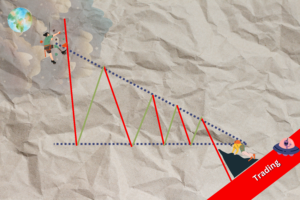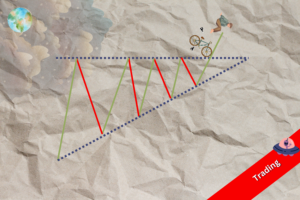The second triangle: the Descending Triangle
Read MoreCan you get rich by trading stocks?
Is it real or just some things people say to get you to pay them?

We’ll keep it real with you — the answer is no, not in most cases — but we aren’t trying to discourage you, but rather we’ll look into why 90% of traders lose their money for the day, and how you can set your expectations when you set for your financial journey.
Most traders lose money
By most, we really mean most. Some studies show 90% of traders lose their money, some go up to 95%. All in all, that’s not a very encouraging statistic, right? We’ll get through the bad things first, and then we’ll look into why many failed, and what can you do to try and perform better.
There is even a looming paradox when people talk about traders losing money, whereby trade order imbalance over the short term indicates profitability for retail traders — but somehow many are losing money. If you’re keen to know how the paradox is debunked, you can look at the paragraph below. You can also skip it if you want — it won’t impede this reading.
A paper explained it whereby the misguided belief that retail traders are making a profit based on the order imbalance test is due to two reasons: The test mostly doesn’t include same-day returns, and the test doesn’t measure the actual returns retail traders earn.
Before we get to the real deal, here’s one real deal that you’d have to realize — all the rich traders you see going around, look at where their source of income is. Here are the most common cases:
- They are already rich, the little percentage they make from trading is not like our usual percentage, their 2% can be a few thousand dollars.
- They make money from teaching people to trade — and some of them went further and create self-enriching pump and dump scams.
- They work for investment firms, in which their fat salaries are the ones shouldering their everyday’s Instagram gourmet lunch.
Here's why many retail traders lose money

Retails would usually herd into attention-grabbing stocks
Studies have found that retail traders tend to go for stocks that are popular. The problem with going with stocks that are the talk of the town is that you go for them when it is already famous. Ask yourself this question, why is it famous in the first place? Most likely because people have already been hoarding it. If that’s the case, then you’ll most likely buy it higher at a time when people are already in the course of selling it.
Here’s another thing *whispers* in many cases, when big guns (big firms, wealthy investors, etc.) start hyping up on a stock, it’s most likely that they’re trying to sell it so that normal people like us will buy it from them as the price rises — this practice is commonly known as offloading. What we’re saying is not to completely distrust this bunch, but take it with a grain of salt and keep in mind, if they can make money all by themselves, why would they want to share it with you?
Emotion is the death of you
The most common emotion that led retail traders (new ones especially) to their doom is fear of missing out (or FOMO). I won’t lie when I say I’m the victim of it myself. Some stocks are hyping up, you see the price goes high, and you decided “Hey, if everyone’s buying it, it can’t be that bad, right?”
Wrong.
Of course, there are times when you look at all these hypes and look at the people who post things like “I made 100x the money I put in — how lucky can I be!”. As inspiring as that is, here’s the thing — there are many other instances when things don’t work out, and do you think they’ll share that with you? “Oh yes, another failed rally today, just lost a few grand, ha-ha,” would they sell that to you?
Overconfidence
Here’s another kind of emotion that would usually mess you up, new traders, especially. There’s no “what if I’m different from the rest?” in trading. You’d read into some clickbait inspiring quotes or stories from the internet, sayings like how Bill Gates swims across the current and buy when people are panicking, and how you should think out of the box.
Here’s the thing, yes, Bill Gates did that, but he knows exactly what he’s doing, he has a hoard of analysts in his firms, and his buddy is Charlie Munger, for the love of God. Yes, a market downturn is a good time to buy at a discount, and yes, you should grab that opportunity but look first, if that’s the strategy you’re compatible with. Warren Buffet invests, and you’re trading — these are two completely different things, will it work out for you?
Another thing is on thinking out of the box. It says “thinking” out of the box, which requires you to think, do your research, and not just stay out of the box just for the sake of staying out of the box. As hard a pill as it is to swallow — you’re not special, there’s no lucky star that will turn what you touch into gold.
A lot of people think “What if it would eventually work out for me?” and that’s the moment you know they’re done for. If you have to ask yourself that question, it means that you don’t even know what you’re buying. Trading is a battlefield, craft your strategies, hold on to them, ignore the noises, and ignore your emotions — fear, greed, etc.
You must make a profit
Here’s the roughest part of trading, if you don’t make a profit for the day, you’re making a loss. If you buy a stock at, say $5, and you sell it at $5. You might think you’re just breaking even — no profit but no loss. Sadly, you’re not — apart from your time, you’re also losing money. You have to pay trading fees, commission, spread fees, etc. to your brokerage.
But, here’s the thing, many experienced traders know this, there will be days, weeks, or even seasons that you’ll be making a loss. It’s part of trading. The key is not to be scared of losses but to manage the risk of loss so that if you lose your money, you can still trade the next day.
Inflation
Many new traders neglect this key factor when it comes to making money. Inflation eats into your profit. Sometimes the money you make isn’t as big as the inflation for the year. You can look at the 10% you make over the years but don’t forget to put inflation into the equation.
Here’s the thing, you have $1,000 to spend today, you could get yourself a good brisket and some other meals, or you could trade with it, and you decide to use it to trade instead. Good for you! After a few years, you managed to make, say, 7% — nice!
However, if the money you have can only afford you the same amount of brisket and meals, you might want to reconsider how you trade. We don’t want to discourage you, but you could’ve just bought the brisket in the first place.
Slippage
Here’s an often-overlooked thing when you trade, the price that you want to buy would most likely be the price you buy at. In many cases, your trade orders will only be filled at a higher price. This is what we call slippage. Say, you want to buy a stock when the price is at $100, but it doesn’t mean that you can buy it at that price, in most cases people are only willing to sell it at a higher price, say, $101. When doing your calculations, you’ll have to take this into account.
Taxes
There’s not much to say about this. You just made money? Awesome! Now here’s the government looking at your cash. Make sure to put this in your calculation.

Management fee (for funds)
If you’re looking into funds, which are managed by a fund manager, you’ll also have to look into its management fees. The funniest part is that many actively managed funds actually underperform the market. In the end, you’ll have to pay their management fees for them to underperform. At that point, it’s much better if you invest in an index ETF, at least you could trace the market’s performance.
Not buying is a trade decision as well, be proud of it
Many traders mistakenly think they must buy, after all, you spent a lot of time doing your research and it might seem like a shame if you decided not to buy after all the efforts. Here’s the thing, not buying is a trading decision as well. If you think that the stock is not in line with your strategy, abandon it. Look for other things to research and buy. Don’t push yourself to just buy it.
Skill issues
Sometimes you just… suck? Trading is not an easy game; even experienced traders lose money. You can’t just walk in unprepared and expect to be making money. There’s a lot of work required for you to be able to understand the market sentiment, and even if you do, you still have the risk of losing money. Imagine if you walk in empty-handed, how well would that be?
Information
Do you know what moves the market the most? Information. A CEO is going to be sacked? A company is not making money? They’re opening a new plant? All of this will move the price up and down.
How to make money from it? By placing your money just before the big news break. The thing is… who are we to have access to this news? This is how big institutions have the biggest advantage over retail traders, their fund managers with deep pockets can just give the insiders a call and they’ll get what they need over lunch. Insider information is very valuable in the business, and they have all the ways of getting it (legally or not).
No one person can constantly be profitable
Big institutions, professionals, and even banks will lose money on their investments at some point. That’s why these big institutions hire so many traders under them. Each of these traders has their own strategies when investing, so when one of them is making a loss, the others can cover their backs. Talking about diversifying risk.
Leverage
One of the ways to get rich when trading is through leverage, but if you want to go for leverage, you’ll need to have enough money to cover you if you make a loss. Here’s the issue, if you have that much money already, then you’re already rich. Else, you can still look at leveraging, but not to a point where you can get rich from it. Also, leverage is a double-edged sword, if you make money it’s going to be multiplied, and if you lose money, it will also be multiplied.
What can you do?

Set your expectations straight
Trading is not a get-rich-quick scheme. Many traders lose money instead of making them. Much like working, it takes time for you to progress. Make sound decisions, don’t get too eager, have a sound strategy, and don’t just follow what everyone else is doing.
Don’t jump straight into day trading
Trading comes in many ways, there are scalping, day trading, swing trading, and position trading. Scalping is a big no-no for beginners, it is where you’d buy and sell within the span of seconds and minutes. Day trading is within 24 hours. We’d suggest that you go for position trading (weeks to years) or swing trading (days to weeks) first to get a hang of the environment. Plus, the shorter the span, the more time you’ll have to spend analyzing the market, and the nature of the stocks commonly sought in day trading itself is usually more volatile.
Be packed with knowledge
We’ve mentioned this many times before, but we’ll say it again, you need to learn the ways first, just be careful not to fall for fake gurus who promise you quick money. There’s no quick money unless you’re doing something shady. Learn how to trade, when can you place a trade, and even when to not place a trade.
The big guns hold the advantage
Institutional traders will always have an advantage over retail traders. They have armies of analysts to do their research, and insider information is their staple. Best put in mind that they aren’t your friends, and if they offer free advice to buy and sell, you might want to take it with a grain of salt, it’s most likely that they just need you — for the better or worse.
Trade well and secure a job at a big firm
If there’s any way for you to get rich, this is it, but even so, the riches are not from trading itself but from the fat paycheck you’ll receive.
Invest instead
Investing is a much more secure way of making money, but of course, you’ll have to wait and it can take years until you can see the gains. Nonetheless, investing also comes with risk, and knowledge is a prerequisite.
Bottom line
Generally, you can’t get rich by trading stocks — of course, depending on your definition of rich, but in many cases, no. You can, however, make money from trading. In order to do that, you’ll have to have the right expectations, the market is a dog-eat-dog world, and going in with only hope and dreams will only lead to your demise. You’ll have to equip yourself with knowledge and ensure that your strategy is sustainable, something that can keep you in the game despite the punches you take. If you think you’re not fit for it, there are plenty of other options you can think of, such as investing, or even going for indices ETFs, but they aren’t for making quick money. There’s no quick money, unless if you’re heavenly lucky, or you’re getting involved in shady business. Other than that, work your way up.
The key takeaways/market update is a series by AxeHedge, which serves as an initiative to bring compact and informative In/Visible Talks recaps/takeaways on leading brands and investment events happening around the globe.
Do keep an eye out for our posts by subscribing to our channel and social media.
None of the material above or on our website is to be construed as a solicitation, recommendation or offer to buy or sell any security, financial product or instrument. Investors should carefully consider if the security and/or product is suitable for them in view of their entire investment portfolio. All investing involves risks, including the possible loss of money invested, and past performance does not guarantee future performance.
Trading Dow Pattern the Triangle Pattern (Part 1)
The first triangle: the Ascending Triangle
Read MoreFunds: Equity Funds (Part 3)
How to choose between equity funds based on companies’ earnings...
Read More



